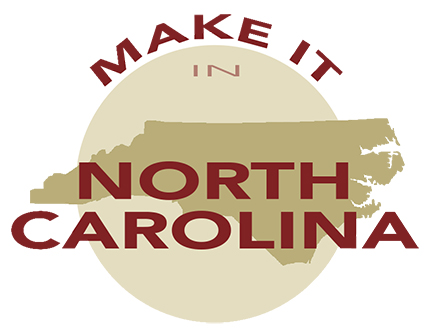
When it comes to collaboration, networking and a can-do attitude, the state of North Carolina deserves to be at the top of any “best at” lists. Perhaps that is why so many people wanting to relocate have been choosing the Raleigh-Durham and Charlotte areas for the past couple of decades. This has helped land them regularly in the top five or better of many “best” lists. In this piece, we’ll take a wider look around the state at some of the lesser known, yet highly attractive places for those seeking quality of life, sense of place, support systems for small and large businesses, and for workers seeking employment where they know they will be valued and appreciated. North Carolina is full of attractive features that can lure businesses and individuals to its various regions and then help ensure their success. Let’s take a look.
In the economic development world, industry sectors and workforce size are usually the first cards laid on the table when trying to entice. To further the poker metaphor, North Carolina has a full house.
Many states can say they have a strong labor force and broad diversity of industry. Few can say they are the top location for any particular sector, but rarer still is to hold the top position in more than one category. North Carolina is not only ranked as having the largest manufacturing workforce in the Southeast, it also holds claim to several top spots in industry rankings.
Even with historical roots in agriculture (and that still being their largest industry sector), the state has a wide range of business and holds the following national titles: Number one in both biotechnology and pharmaceutical manufacturing, largest furniture manufacturing, second most popular tech hub and second largest for food and beverage processing. The list continues into various levels of top spots for automotive, aerospace, logistics, agriculture and textiles.
So why is there so much success? Perhaps it is the focus on teamwork. Historically, North Carolina has been a place where collaboration in economic development at all levels has been valued and enacted for quite some time. There have been periods when they wobbled away from that, like during the previous governor’s term, but overall they have done an excellent job at maintaining cohesion and a sense of teamwork from the state level down to the small town chambers. The spirit of working together, instead of competing against each other, is alive and well across the state.
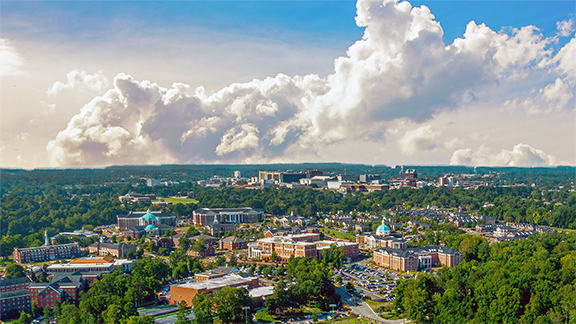 State programs like NC Works, One North Carolina Fund, Job Development Investment Grant (JDIG) and building reuse grants are put to good use here, revitalizing old mills, repurposing various business campuses and finding good matches between workers and industry. There are also a wide variety of regional programs with various groups: The Golden Leaf Foundation, NC Carolina Core, Piedmont Triangle Partnership, ElectriCities of North Carolina and a host of others, along with local township, county and city, help ensure companies and people have what they need to succeed.
State programs like NC Works, One North Carolina Fund, Job Development Investment Grant (JDIG) and building reuse grants are put to good use here, revitalizing old mills, repurposing various business campuses and finding good matches between workers and industry. There are also a wide variety of regional programs with various groups: The Golden Leaf Foundation, NC Carolina Core, Piedmont Triangle Partnership, ElectriCities of North Carolina and a host of others, along with local township, county and city, help ensure companies and people have what they need to succeed.
If you are looking for a sense of community and a place to belong, North Carolina is chock full of areas offering it, each with its unique twist.
 Fayetteville/Cumberland County is one such place. With over 57,000 military personnel from Fort Bragg and as home to the first responder units who are deployed in all sorts of emergencies, both domestically and abroad, it is no surprise that there is a strong sense of service to others. After two years of extensive market research aimed at finding the strengths and common threads of their community, the area, branded “Can Do Carolina,” found these four pillars that describe their community: “We find a way, we care for one another, we protect the world and we always go further.”
Fayetteville/Cumberland County is one such place. With over 57,000 military personnel from Fort Bragg and as home to the first responder units who are deployed in all sorts of emergencies, both domestically and abroad, it is no surprise that there is a strong sense of service to others. After two years of extensive market research aimed at finding the strengths and common threads of their community, the area, branded “Can Do Carolina,” found these four pillars that describe their community: “We find a way, we care for one another, we protect the world and we always go further.”
This team-oriented mindset is pervasive not only in the military residents, but throughout their diverse population. . .a diversity that may be surprising to some. Robert Van Goens, president and CEO of the Fayetteville-Cumberland County Economic Development Corporation, summed it up well by saying, “There are 85 languages from 86 countries spoken in our schools.”
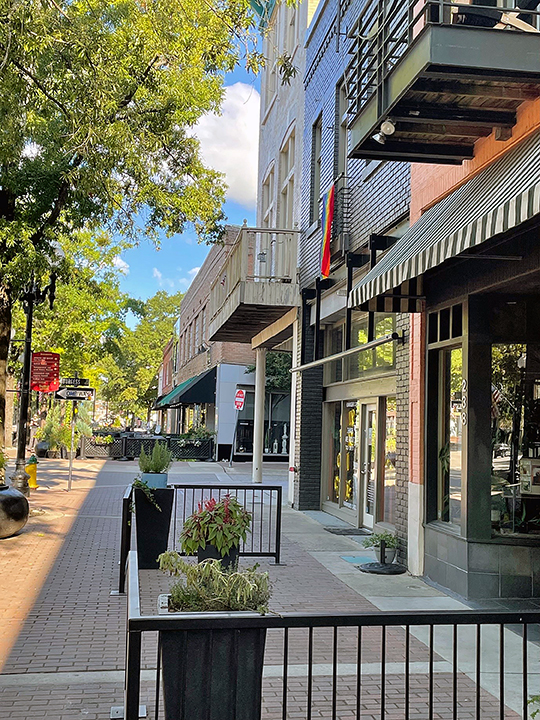 Contributing to this international variety in population is the fact that they are a Host Community of the Global Special Operations Forces Communities of Excellence (GSOF) in which they foster global collaboration and cooperation between international cities. These partnerships, along with a thriving downtown, a plan to build a 100 percent fiber optic network, thoughtful assistance programs and inordinately helpful residents have helped to increase economic and cultural growth. Just this April, Forbes wrote a piece in which they called Fayetteville “a city on the rise” and “one of the most accessible American cities.” You can see the results of this rise to popularity reflected in some of the businesses that have chosen to locate, expand and invest there recently, including Amazon, Cargill, Metronet and Dansons, to name just a few.
Contributing to this international variety in population is the fact that they are a Host Community of the Global Special Operations Forces Communities of Excellence (GSOF) in which they foster global collaboration and cooperation between international cities. These partnerships, along with a thriving downtown, a plan to build a 100 percent fiber optic network, thoughtful assistance programs and inordinately helpful residents have helped to increase economic and cultural growth. Just this April, Forbes wrote a piece in which they called Fayetteville “a city on the rise” and “one of the most accessible American cities.” You can see the results of this rise to popularity reflected in some of the businesses that have chosen to locate, expand and invest there recently, including Amazon, Cargill, Metronet and Dansons, to name just a few.
 Another area that understands the power of partnership is Guilford County. Six years ago a group of civic leaders realized the benefits of collaboration between High Point and Greensboro. Each city maintains autonomy with its separate economic development agencies —
Another area that understands the power of partnership is Guilford County. Six years ago a group of civic leaders realized the benefits of collaboration between High Point and Greensboro. Each city maintains autonomy with its separate economic development agencies —
High Point Economic Development Corporation and Greensboro Chamber of Commerce — but, as of 2015, there is also the Guilford County Economic Development Alliance (GCEDA). The two Cities managers and mayors, along with the County manager and Board of Commissioners Chair, meet regularly to assure the alliance carries out its mission to facilitate exponential growth for both cities and the surrounding area. Their work is paying off. Since its inception, there have been 107 announcements: 17 new companies, 10,581 new jobs and over $1.3 billion in overall investment.
High Point and Greensboro, like other cities and towns in North Carolina, have taken advantage of the state’s building reuse grants and other funds to create renaissance waves in their respective
downtowns.
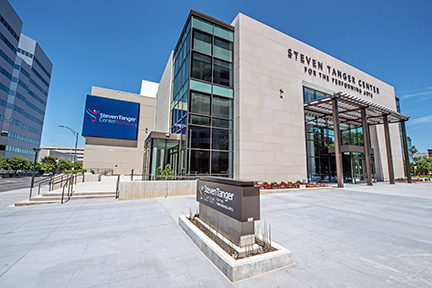 High Point is nicknamed “North Carolina’s International CityTM” because of its fame for hosting the state’s biggest economic event that draws thousands of internationals. It is a twice-yearly trade show that generates an estimated $6.73 billion and is the world’s largest for home furnishings.
High Point is nicknamed “North Carolina’s International CityTM” because of its fame for hosting the state’s biggest economic event that draws thousands of internationals. It is a twice-yearly trade show that generates an estimated $6.73 billion and is the world’s largest for home furnishings.
The changes to downtown have no doubt made visitors as well as High Point’s current residents (many of which are higher education students in the regions 16 colleges and universities) happy. Over $200 million has gone into rejuvenating High Point’s downtown with some interesting new projects. Congdon Yards has transformed an old hosiery mill into a new gathering hub that provides “a new destination to work, gather, innovate and celebrate.” Barbour Spangle Design and Culp, long-time High Point companies, are making their business homes at Congdon Yards. Overall, the past six years have brought in a variety of new restaurants, shops and office space. Sandy Dunbeck, Director of High Point Economic Development Corporation states, “Key Risk, a Fortune 500 Berkley company, has just announced the intention to move their headquarters operation to downtown High Point. They will be in 275 North Elm Street, a brand new office building in the Outfields of High Point’s Multipurpose Stadium.” To accommodate this growth on the housing side, the area is on track to build hundreds of new homes, which will sell in the mid $200s, a range considered one of the most affordable for U.S. mid-sized metros. Developers are also planning apartment and condo units in the downtown.
High Point University also plays an important role in the region’s success, not only by producing well-educated, well-rounded adults, but also as a leader of community involvement. Students, faculty and staff average 108,000 hours of volunteer service annually. The university hosts more than 150 sports and cultural events.
 High Point University’s Idea Incubator (Think Tank), which is focused on ensuring the city continues to thrive, is one of the many examples of the robust network of support for existing businesses and entrepreneurs to find success and then use it to help the community. Other available support programs include CEOs for Cities, High Point Young Professionals Group and Leadership High Point.
High Point University’s Idea Incubator (Think Tank), which is focused on ensuring the city continues to thrive, is one of the many examples of the robust network of support for existing businesses and entrepreneurs to find success and then use it to help the community. Other available support programs include CEOs for Cities, High Point Young Professionals Group and Leadership High Point.
Nearby Greensboro has found similar success and made profound changes to its downtown with investments in streetscapes, parks, a baseball stadium and renovations of many of its buildings, including the opening of both a new vegan restaurant and a wine bar. But Marvin Price of the Greensboro Chamber of Commerce thinks the “crown jewel and the game-changer that will be the catalyst to drive continued growth” is the construction of what may become one of the state’s most attractive performing arts centers.
 Located intentionally near adjacent parks (one of which is LeBauer Park, which Marvin Price says is “a great melting pot in the community, where people walk their dogs, attend different festivals including food truck festivals”), the Steven Tanger Center for the Performing Arts is in its final days of construction and slated to open September 2021. Price said, “Any Broadway play that you would be able to see in New York, you’re going to be able to see in Greensboro, N.C.” He thinks this has helped spur companies already located in Greensboro “to double down on their investment in the community.” Price used Syngenta, a Fortune 500 company with decades-old roots in Greensboro, as an example. Needing to expand and build a new headquarters, they conducted a site search. Price said, “They could have really moved anywhere in the world.” But they chose to invest $68 million in their current campus and in doing so, retained 750 jobs where average wage is over $100,000. Price believes this is a “telltale sign for people looking at North Carolina. . .that we are on the precipice of something truly transformational.”
Located intentionally near adjacent parks (one of which is LeBauer Park, which Marvin Price says is “a great melting pot in the community, where people walk their dogs, attend different festivals including food truck festivals”), the Steven Tanger Center for the Performing Arts is in its final days of construction and slated to open September 2021. Price said, “Any Broadway play that you would be able to see in New York, you’re going to be able to see in Greensboro, N.C.” He thinks this has helped spur companies already located in Greensboro “to double down on their investment in the community.” Price used Syngenta, a Fortune 500 company with decades-old roots in Greensboro, as an example. Needing to expand and build a new headquarters, they conducted a site search. Price said, “They could have really moved anywhere in the world.” But they chose to invest $68 million in their current campus and in doing so, retained 750 jobs where average wage is over $100,000. Price believes this is a “telltale sign for people looking at North Carolina. . .that we are on the precipice of something truly transformational.”
A key element in the success of this dynamic duo of cities, as well as the businesses located within and around them, is the logistics side of the picture. The area was noted as “punching above its weight” by logistics website Ajot.com, and went on to say, “Greensboro-High Point has developed an excess of modern transportation and logistics capacity, especially considering the decrepitude of much of the infrastructure in the United States. From an over-abundance of interstate highways to the proactive improvement of 1,000 acres at Piedmont Triad International Airport, the region is in the same class as logistics hubs like Indianapolis, Columbus and Louisville.”
North Carolina has 81,104 miles of state controlled roadways that were ranked 14th in the nation for overall State Highway Performance by Reason Foundation, a nonpartisan public policy research group. Over $672 billion, yes that’s “b” for billion, worth of goods are trucked to and from sites in North Carolina, that’s 81 percent of its overall goods. According to a report from the NC Chamber Foundation published last year, “Locations within a mile of North Carolina highway improvements experienced a 35 percent increase in employment.” This forward-looking report goes on to say that additional funding is needed for North Carolina to keep its roads on par with the explosive growth throughout the state.
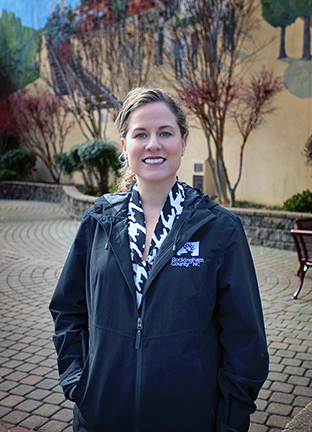 Rockingham County, located north of Greensboro near the border of Virginia, with a 232 percent economic growth from 2018 to 2019, is a good example of this explosion. Perhaps its most dynamic offering for business success may be the team running The Rockingham County Center for Economic Development, Small Business and Tourism. Led by Leigh Cockram, 2021 winner of the NCEDA Economic Developer of the Year Award, this small but mighty team provides some very hands-on help. Along with the usual support found from economic development organizations, Cockram and her associates are particularly adept at utilizing the resources available to business for development. Many programs have cumbersome demands asked of those who attain funds for development and expansion. These can be overwhelming and fraught with unknowns that can hamper success.
Rockingham County, located north of Greensboro near the border of Virginia, with a 232 percent economic growth from 2018 to 2019, is a good example of this explosion. Perhaps its most dynamic offering for business success may be the team running The Rockingham County Center for Economic Development, Small Business and Tourism. Led by Leigh Cockram, 2021 winner of the NCEDA Economic Developer of the Year Award, this small but mighty team provides some very hands-on help. Along with the usual support found from economic development organizations, Cockram and her associates are particularly adept at utilizing the resources available to business for development. Many programs have cumbersome demands asked of those who attain funds for development and expansion. These can be overwhelming and fraught with unknowns that can hamper success.
“I don’t like surprises, good or bad, and we try to make sure our companies don’t have surprises. I think it’s one of the major reasons why we won Pella [Windows],” said Cockram. No doubt she’s right. It’s also likely that the new workforce development training facility, currently under construction in Rockingham, contributed to landing Pella and a handful of others in the last two years. Nestle Purina, Ontex Group, Farmina, and Sturm, Ruger & Company have all made announcements in Rockingham County. All told, 892 new jobs are heading to the area in the coming years.
 Another special perspective widely held among leaders and residents of the Rockingham area is an acute awareness of the importance of clean water and good stewardship of the environment. Unfortunately, this insight was gained as a result of a 2014 disaster. A drainage pipe burst at a coal ash containment pond owned by Duke Energy in Eden, N.C., sending 39,000 tons of coal ash into the Dan River. The spill had horrendous effects on the river, poisoning and killing its inhabitants. Dead fish and crayfish could be seen floating in the ash-laden water. Luckily for the town, the drinking supply was unaffected because it came from above where the spill occurred.
Another special perspective widely held among leaders and residents of the Rockingham area is an acute awareness of the importance of clean water and good stewardship of the environment. Unfortunately, this insight was gained as a result of a 2014 disaster. A drainage pipe burst at a coal ash containment pond owned by Duke Energy in Eden, N.C., sending 39,000 tons of coal ash into the Dan River. The spill had horrendous effects on the river, poisoning and killing its inhabitants. Dead fish and crayfish could be seen floating in the ash-laden water. Luckily for the town, the drinking supply was unaffected because it came from above where the spill occurred.
What was affected, though, was the economy in the area. In the months immediately following the spill, river-related businesses, restaurants, motels and others around Eden took a huge economic hit, as people concerned about contact with coal ash-contaminated water shied away.
Duke has since spent millions to mitigate the problem and there are many watchful eyes on the Dan to ensure its good health. Good Stewards of Rockingham, a local grassroots group and member of the national Water Keeper Alliance, formed in June of 2014. The spill prompted new EPA oversight and rules concerning coal ash and ash pits. It also sparked a better understanding of the role water and the natural environment play in economies. During our discussion on what makes Rockingham County unique for ensuring business success, Leigh Cockram mentioned their strong awareness that a clean environment plays an important part in ensuring the health of residents, communities and economies. To that end, Rockingham has invested heavily in clean energy — $104 million total, with $99.6 million of that going towards solar photovoltaic.
Rockingham represents a state norm on clean energy. According to a new report conducted by RTI International, North Carolina has invested $40.3 billion in renewables over the last 14 years. That investment has helped keep it in national top spots of clean energy rankings, but more importantly, it has supported jobs. As of 2019, nearly 113,000 North Carolinians worked in solar, wind, energy efficiency, grid modernization, energy storage, clean vehicles and other clean energy occupations. Duke Energy and Dominion Electric are the largest companies providing clean electrical energy, but they are not alone.
NC Electric Cooperatives also provide power through 26 different non-profits in 93 counties. They can be an attractive alternative for businesses and residents to get their electricity as member-owner. Like their larger counterparts, these coops play active roles in their communities in a variety of ways and offer corporate assistance including zero interest loans.
Another interesting entity involved with utilities and economic development is ElectriCities of N.C., an organization that acts as an umbrella system for municipalities that own their own electric distribution systems. Of the 10.5 million people in North Carolina, 1.3 million get their power from municipally or locally owned utilities. ElectriCities works on their behalf as a buyers club providing collective strength for wholesale purchasing, as well as for other things including emergency recovery assistance, legislative and regulatory affairs and a wide range of economic development services.
Two of the many strong suits of this network are the ability to offer negotiated rates to industry customers and a far higher reliability rate than other electric power suppliers. According to Drew Elliot, Manager, Government Affairs of ElectriCities NC, “We beat the pants off of the others when it comes to reliability and outage restoration. Our customers enjoy on average one outage per year and power is on 99.98 percent of the time.”
 Throughout the state, utility providers can be powerful partners to new or expanding businesses. The turnaround of Whitaker Park located in Winston-Salem is a good example of another team effort in North Carolina that’s helping businesses realize success.
Throughout the state, utility providers can be powerful partners to new or expanding businesses. The turnaround of Whitaker Park located in Winston-Salem is a good example of another team effort in North Carolina that’s helping businesses realize success.
The former center for R.J. Reynolds Tobacco Company’s manufacturing operations consists of 13 buildings on 220 acres. The campus, built in 1961, was shut down and abandoned in mid-2012. Then in 2017, the property formally changed hands and the Whitaker Park Development Authority Inc., a nonprofit corporation created in 2011, became the new owner. Duke Energy made the first large investment to change the electrical infrastructure so multiple tenants instead of just one could use the property.
The goal was to remake the campus and offer new tenants a range of uses from light manufacturing and R&D, to residential and retail. With Bob Leak, an experienced Winston-Salem economic developer of 33 years, acting as CEO, Whitaker Park has become a booming success. At the time of writing this article, the park has either sold or has sale pending on all but one building and one land parcel. As a matter of fact, just a few days ago, a new project was announced for Nature’s Value, a global vitamin and supplement manufacturer. The company plans to build state-of-the-art facilities, investing $19 million and creating 183 new jobs.
The plans will be facilitated, in part, with a state Job Development Investment Grant (JDIG) which will potentially reimburse the company as much as $1,954,800 spread over 12 years. Additionally, because the company is locating in Forsyth County, classified by the state’s economic tier system as a Tier 2, the JDIG agreement calls for as much as $217,200 into the state’s Industrial Development Fund’s Utility Account. This account helps rural communities finance infrastructure upgrades to attract new business.
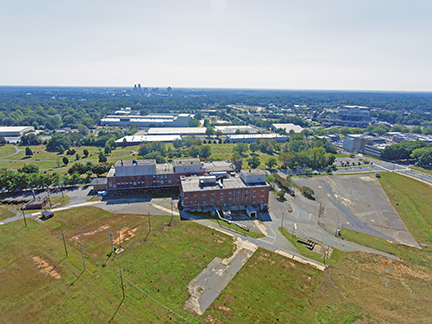 Nature’s Value will have some great neighbors. Already announced or located there are: Cook Medical, Second Harvest Food Bank of Northwest North Carolina, Forsyth County Education and developer Chris Harrison, who plans to renovate two historic plants into 164 residential units and build 25,000 square feet of new retail space along with a 125-room hotel.
Nature’s Value will have some great neighbors. Already announced or located there are: Cook Medical, Second Harvest Food Bank of Northwest North Carolina, Forsyth County Education and developer Chris Harrison, who plans to renovate two historic plants into 164 residential units and build 25,000 square feet of new retail space along with a 125-room hotel.
Whitaker Park is not the only substantial piece of real estate in the Winston-Salem area being repurposed. Another R.J. Reynolds holding, the former tobacco campus now called Innovation Quarter, has become a tony hub for food, music, retail and cultural gatherings. This 330-acre mixed-use development is home to 90 businesses, five academic institutions and over 1,000 apartments. You can meander along the pathways built over old railroad tracks, find a table in the welcoming lower courtyard, get a brick-oven slice, a house brewed beer and then sit back to enjoy the company of the community and live music.
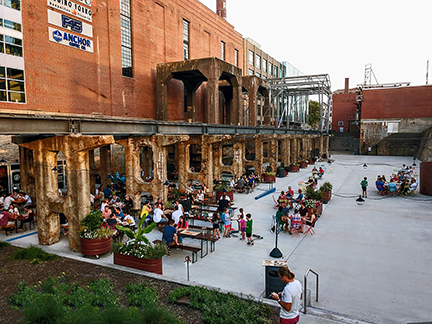 There is a quote found on the Innovation Quarter’s website: “Innovation Quarter is a place where diverse people, a unique mixed-use environment and a welcoming community spark the creativity and collaboration that drive innovation and growth.”
There is a quote found on the Innovation Quarter’s website: “Innovation Quarter is a place where diverse people, a unique mixed-use environment and a welcoming community spark the creativity and collaboration that drive innovation and growth.”
This sentiment could be used to sum up the business climate of the entire state. If you are looking to make something, achieve success in business or simply make a good life in a welcoming, diverse community, this state offers it all. There are plenty of ways to find support for creativity and collaboration there and to become part of what drives both innovation and growth for North Carolina and beyond.